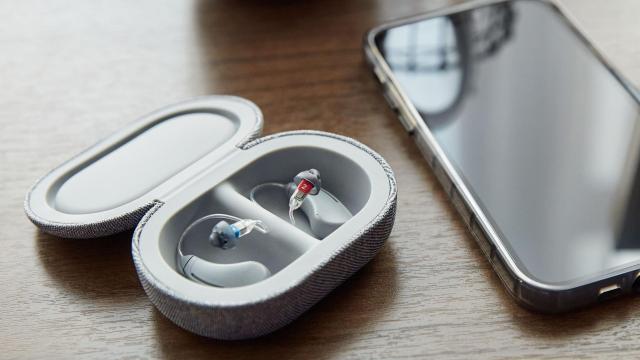While you might expect that Bose’s latest gadget has something to do with music, it’s actually a lot closer to wearable health tech. In fact, they’re actually FDA-cleared, self-fitted hearing aids designed for people with mild to moderate hearing loss.
Editor’s Note: These hearing aids are not currently approved for medical use in Australia.
The Bose SoundControl Hearing Aids are technologically intriguing. They feature a behind-the-ear, receiver-in-canal design with the help of a companion app, allowing users to customise their settings using two controls. The “World Volume” control amplifies quiet sounds to louder ones, while the Treble/Bass setting can be used to fine-tune vocal frequencies. It also supports preset modes so you can, for instance, focus on conversations in loud environments, or choose a setting that lets in all ambient sounds for better awareness.
The big thing, however, is that the FDA has cleared the hearing aids for direct-to-consumer use. Meaning, you can buy the Bose hearing aids without having to go through the traditional process of visiting a doctor and getting fitted by an audiologist. Setup is guided via the Bose Hear app, and if a customer wants extra assistance, Bose says they can set up free one-on-one video appointments with product experts.
“In the United States alone, approximately 48 million people suffer from some degree of hearing loss that interferes with their life. But the cost and complexity of treatment have become major barriers to getting help,” Brian Maguire, category director of Bose Hear, said in the press release.
There are several reasons why a person might want to avoid the doctor’s office — medical expenses, the U.S.’s broken healthcare system, an ongoing pandemic, and if you’re in a rural area, accessibility to specialised doctors might be hard to come by. Bose isn’t the first company to tout circumventing all of that as a benefit for a health tech gadget. Helping matters is its FDA clearance and, in this particular instance, Bose funded a study conducted by Northwestern University researchers. The gist is that Bose’s self-fitted hearing aids delivered results similar to traditional hearing aids that are fitted with the help of an audiologist. The study also found that participants were more “satisfied” with the sound quality of Bose’s devices than those tuned by professionals.
This all sounds great, and truly, the tech involved is impressive. However, health tech is still a sort of wild, loosely regulated frontier, and it pays to be sceptical if you’re thinking about investing in a pair of these. For starters, FDA clearance is not the same as FDA approval, even though many consumers assume that to be the case. This particular product — like most medical devices — was cleared via the 510(k) process. That means the FDA cleared a device because it was “substantially equivalent” to a device that already has FDA approval or clearance — or what’s referred to as a predicate. This makes it easier to fast-track new devices, but critics say the system needs an overhaul as gadgets cleared this way often skip testing and clinical trials — meaning many have had the bare minimum of government scrutiny. There have been cases of safety issues with 510(k)-cleared devices based on outdated predicates. In this case, although Bose has a validation study, one study with a small sample size of 75 participants is not a guarantee that the device is bulletproof. To confuse things further, federal law states that getting 510(k) clearance “does not in any way denote official approval of the device. Any representation that creates an impression of official approval of a device because of complying with the premarket notification regulations is misleading and constitutes misbranding.”
This isn’t to say that Bose’s hearing aids will destroy your ears, that this tech isn’t worth buying, or that Bose is at fault for the limitations of the FDA’s clearance process. It’s just a reminder to maintain some healthy scepticism when you see new health tech gadgets bandy about the phrase “FDA clearance.” These phrases are absolutely not a green light to skip doing your due diligence. Again, there are likely people who might be better served by over-the-counter, self-fitted hearing aids. But it’s also a mistake to view that as a go-ahead to skipping the doctor altogether. If you suspect you’re undergoing hearing loss and you’re lucky enough to have health insurance in this godforsaken system, it doesn’t hurt to get your doctor’s opinion on whether this device is a viable solution for you.
Now that you’ve gotten all the way through this friendly PSA, the Bose SoundControl Hearing Aids will cost $US850 ($1,084), are compatible with iOS and Android, and are eligible for FSA and HSA reimbursement. They go on sale starting May 18 on Bose’s website, but you do have to be a resident of Massachusetts, Montana, North Carolina, South Carolina, or Texas to buy them. Bose says nationwide availability will follow, though didn’t provide a clear timeline.
